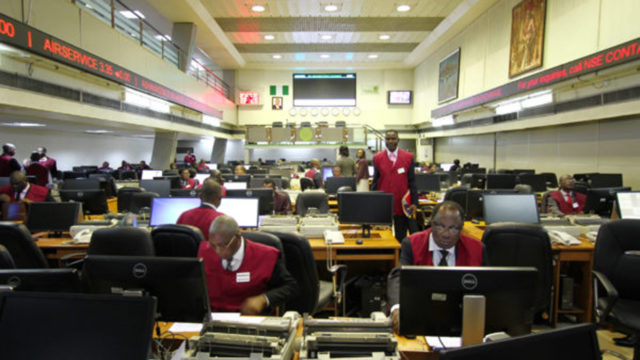Despite Downturn, Equities Market Gains N5.35trn In 11 Months
The equities market of the Nigerian Stock Exchange (NSE) gained N5.35trillion in 11 months of 2020, InsideBusinessNG can report.
Consequently, the equities market benchmark, the All-Share Index (ASI) closed its Year-Till-Date (YTD) performance at 30.55 per cent to 35,042.14 basis points from 26,842.07 points it opened for trading in 2020 amid global and domestic economic challenges.
InsideBusinessNG gathered that the market capitalisation closed on Monday, the last day of trading in November at N18.31trillion as against N12.96trillion it opened for trading this year
The market fluctuated within the 11 months but the bullish closure on the last day of November that saw the All-Share index, (ASI) grew by 0.45 per cent, rising to 35,042.14 basis points from the 34,885.51 basic points of Friday 27th November, led to N82 billion gain.
The surge in stocks on that particular day was hugely influenced by the appreciation in capitalized equities. Amongst which are; MTN Nigeria, Airtel Africa, FCMB, Union Bank and AIICO Insurance.
The market turnover increased astronomically as investors traded in 415.531 million shares, worth N4. 897 billion in 5,267 deals, against 190.280 million worth of shares traded at N3.330 billion in 3,976 deals on Friday. The market breadth on the last day was marginally positive, with 30 gainers compared to 29 losers. The losers’ chart was dominated in percentage terms by Nigeria Flourmills Plc losing by 10 per cent to close at N6.93 per share.
Fidson Plc dipped by 9.87 per cent to close at N4.93 per share, while Unilever Plc declined by 5.82 per cent to close at N12. 95 per share. Also, Guaranty Trust Bank depreciated by 5.14 per cent to close at N33.2 per share, while BUA Cement shed 1.79 per cent to close at N55 per share.
On the flip side, Airtel Africa and AIICO Insurance led the gainers ‘ chart in percentage terms, gaining 10 per cent to close at N588. 5 and N1. 1 per share respectively. FCMB rose by 2.46 per cent to close at 3.33 per share, while Union Bank Plc surged by 1.82 per cent to close at N5. 6 per share. Also, MTN grew by 0.13 per cent to close at N155. 2 per share.

Multiverse Plc Led the activity chart in volume parameters selling 84. 009 million shares worth N16. 801. 801 billion, while Zenith Bank followed when it sold 47. 021 million shares valued at N1. 134 billion. Transcorp came next when it traded 34.072 million shares worthN34. 291 million, while, Acess Bank sold 29. 904 million shares atN256. 045 million. Also, Mutual Benefits Assurance sold 21. 566 million shares worth N4. 659 million.
Analysts are quick to attribute the growth to the policies wrought by both the Central Bank of Nigeria (CBN) and the NSE, stressing that renewed buying of cheap listed stocks of late lifted the equities market.
Capital market analysts stated that the domestic equities market has continued to rally as investors’ appetite for the risky asset was sustained given the low-yield fixed-income environment and the positive 10 months corporate earnings releases.
This year has been one of the most eventful years for the global economy and more specifically, the Nigerian economy.
First, the outbreak of the COVID-19 pandemic brought the Nigerian economy to a halt as the government, like others across the world, implemented strict lockdown measures to curb a further spread of the virus.
Notably, the NSE which had started out as the best performing equities market in the world at the beginning of the year, quickly sank into bear territory, reaching a historic low at the peak of lockdowns.
However, the equities market downfall did not last for long as government’s relaxation of lockdown measures, the low-interest rate in the fixed income market coupled with resilient performance posted by corporates during the peak of lockdown in Q2, 2020 and growing financial system liquidity in H2, 2020 sparked a bullish run on the Nigerian stock market.
United Capital Plc hinted that the stock market is clearly the only game in town, thanks to the low yield environment. It urged reluctant investors to get involved, ahead of huge maturities expected to bolster stock prices.
According to the Investment House, with mouthwatering returns delivered to investors so far, we are continuously inundated with two questions. When do you see the interest rate environment turning and do you think the stock market rally is sustainable? Well, we think both questions are related, given that a return to double-digit yield environment will clearly discourage the recent bullish sentiment for stocks.
“However, we do not see a return to double-digit yield in the interim, no thanks to trillions of naira worth of maturities in the horizon, projected to remain till Q1, 2021. Meanwhile, foreign portfolio investors (FPIs) funds (in several billion dollars) remained trapped in Nigeria due to currency market illiquidity, some of this would find their way into stocks, in search of alpha. Lastly, the few Q3, 2020 earnings so far submitted points to stronger than expected full-year earnings, as observed in Lafarge Africa, Stanbic IBTC Holdings and Flour Mills. Thus, we do not see a sharp pullback in stock prices for now.”
Speaking with our correspondent, the chief economist/head, Investment Research of PanAfrican Capital Holdings, Moses Ojo attributed the equities market performance to low yield in fixed income instruments, saying that low yield in treasury bills created room for foreign Investors invest in the fundamentals shares on the NSE.
He expressed further that mixed earnings by listed banks tend to drive the equities market further in November. According to him, in this situation, there will be fund switching and the only short to medium term alternative asset class is the equities market.


Comments are closed.